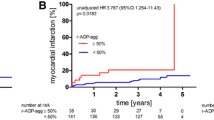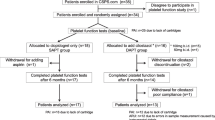Abstract
Background Current evidence supports the preventive role of statins on platelet aggregation in patients with coronary heart disease. Aim Our aim was to determine the effects of aggressive statin therapy on platelet function in patients with coronary heart disease. Material and methods A total of 178 consecutive patients (37–68 years old, 35.9% women) with stable coronary artery disease (CAD) was enrolled in the study. Platelet function assays were realized by the Platelet Function Analyzer (PFA)-100 with collagen and epinephrine (Col/Epi) and collagen and ADP (Col/ADP) cartridges. Aspirin resistance was defined as having a closure time (CT) of <186 s with Col/Epi cartridges despite regular aspirin therapy. A statin therapy protocol applied to the patients with aspirin resistance for 3 months. Results We determined that 20 (11.2%) of patients had aspirin resistance by the PFA-100. Mean closure time measured with the Col/ADP cartridges was 83 ± 18 s (53–162 s). Of the patients 12 were not on a statin therapy and eight were taking 10 mg daily atorvastatin. After 3 months of 40 mg daily atorvastatin therapy 13 subjects with aspirin resistance became aspirin sensitive by PFA-100 (P < 0.0001). There was also a significant decrease in total and LDL cholesterol levels and an increase in HDL cholesterol at the third month of statin therapy (P < 0.0001 for all). Conclusion Statin therapy reduced the in vitro aspirin resistance in 65% of the patients after a therapy of 3 months. Further studies are needed to elucidate the mechanism of statins’ effects on platelet reactivity.
Similar content being viewed by others
References
MRC/BHF Heart Protection Study of cholesterol lowering with simvastatin in 20,536 high-risk individuals: a randomised placebo-controlled trial (2002) Lancet 360:7–22
Nissen SE, Tuzcu EM, Schoenhagen P, et al for the REVERSAL Investigators (2004) Effect of intensive compared with moderate lipid-lowering therapy on progression of coronary atherosclerosis: a randomized controlled trial. JAMA 291:1071–1080
Vaughan CJ, Gotto AM Jr, Basson CT (2000) The evolving role of statins in the management of atherosclerosis. J Am Coll Cardiol 35:1–10
Relou IA, Hackeng CM, Akkerman JW, Malle E (2003) Low-density lipoprotein and its effect on human blood platelets. Cell Mol Life Sci 60(5):961–971
Mammen EF, Alsbameeri RS, Comp PC (1995) Preliminary data from a field trial of the PFA-100® system. Semin Thromb Hemost 21:113–121
Szapary L, Horvath B, Marton Z, Alexy T, Kesmarky G, Habon T, Szots M, Koltai K, Juricskay I, Czopf J, Toth K (2004) Short-term effect of low-dose atorvastatin on haemorrheological parameters, platelet aggregation and endothelial function in patients with cerebrovascular disease and hyperlipidaemia. CNS Drugs 18(3):165–172
Osamah H, Mira R, Sorina S, Shlomo K, Michael A (1997) Reduced platelet aggregation after fluvastatin therapy is associated with altered platelet lipid composition and drug binding to the platelets. Br J Clin Pharmacol 44(1):77–83
Tekten T, Ceyhan C, Ercan E, Onbasili AO, Turkoglu C (2004) The effect of atorvastatin on platelet function in patients with coronary artery disease. Acta Cardiol 59(3):311–315
Thompson PD, Moyna NM, White CM, Weber KM, Giri S, Waters DD (2002) The effects of hydroxy-methyl-glutaryl co-enzyme A reductase inhibitors on platelet thrombus formation. Atherosclerosis 161(2):301–306
Puccetti L, Pasqui AL, Pastorelli M, Bova G, Cercignani M, Palazzuoli A, Angori P, Auteri A, Bruni F (2002) Time-dependent effect of statins on platelet function in hypercholesterolaemia. Eur J Clin Invest 32(12):901–908
Cipollone F, Prontera C, Pini B, et al (2001) Overexpression of functionally coupled cyclooxygenase-2 and prostaglandin E synthase in symptomatic atherosclerotic plaques as a basis of prostaglandin E(2)-dependent plaque instability. Circulation 104:921–927
Belton O, Byrne D, Kearney D, Leahy A, Fitzgerald DJ (2000) Cyclooxygenase-1 and -2-dependent prostacyclin formation in patients with atherosclerosis. Circulation 102:840–845
Larsson PT, Wallen NH, Hjemdahl P (1994) Norepinephrine-induced human platelet activation in vivo is only partly counteracted by aspirin. Circulation 89:1951–1957
Pamukcu B, Oflaz H, Acar RD, et al (2005) The role of exercise on platelet aggregation in patients with stable coronary artery disease: exercise induces aspirin resistant platelet activation. J Thromb Thrombolysis 20:17–22
Davis JW, Hartman CR, Lewis HD, et al (1985) Cigarette smoking-induced enhancement of platelet function: lack of prevention by aspirin in men with coronary artery disease. J Lab Clin Med 105:479–483
Santos MT, Valles J, Marcus AJ, et al (1991) Enhancement of platelet reactivity and modulation of eicosanoid production by intact erythrocytes. J Clin Invest 87:571–580
Kawasaki T, Ozeki Y, Igawa T, Kambayashi J (2000) Increased platelet sensitivity to collagen in individuals resistant to low-dose aspirin. Stroke 31:591–595
Pamukcu B, Oflaz H, Nisanci Y (2005) The role of platelet glycoprotein IIIa polymorphism in the high prevalence of in vitro aspirin resistance in patients with intracoronary stent restenosis. Am Heart J 149:675–680
Jefferson BK, Foster JH, McCarthy JJ, et al (2005) Aspirin resistance and a single gene. Am J Cardiol 95:805–808
Maree AO, Curtin RJ, Chubb A, et al (2005) Cyclooxygenase-1 haplotype modulates platelet response to aspirin. J Thromb Haemost 10:2340–2345
Acknowledgments
The study was supported by ‘Turkish Society of Cardiology’. The PFA-100 device and its test cartridges were bought with the research grant of the society. The society is a non-profit association and a member of the ‘European Society of Cardiology’.
Author information
Authors and Affiliations
Corresponding author
Rights and permissions
About this article
Cite this article
Tirnaksiz, E., Pamukcu, B., Oflaz, H. et al. Effect of high dose statin therapy on platelet function; statins reduce aspirin resistant platelet aggregation in patients with coronary heart disease. J Thromb Thrombolysis 27, 24–28 (2009). https://doi.org/10.1007/s11239-007-0154-1
Received:
Accepted:
Published:
Issue Date:
DOI: https://doi.org/10.1007/s11239-007-0154-1




